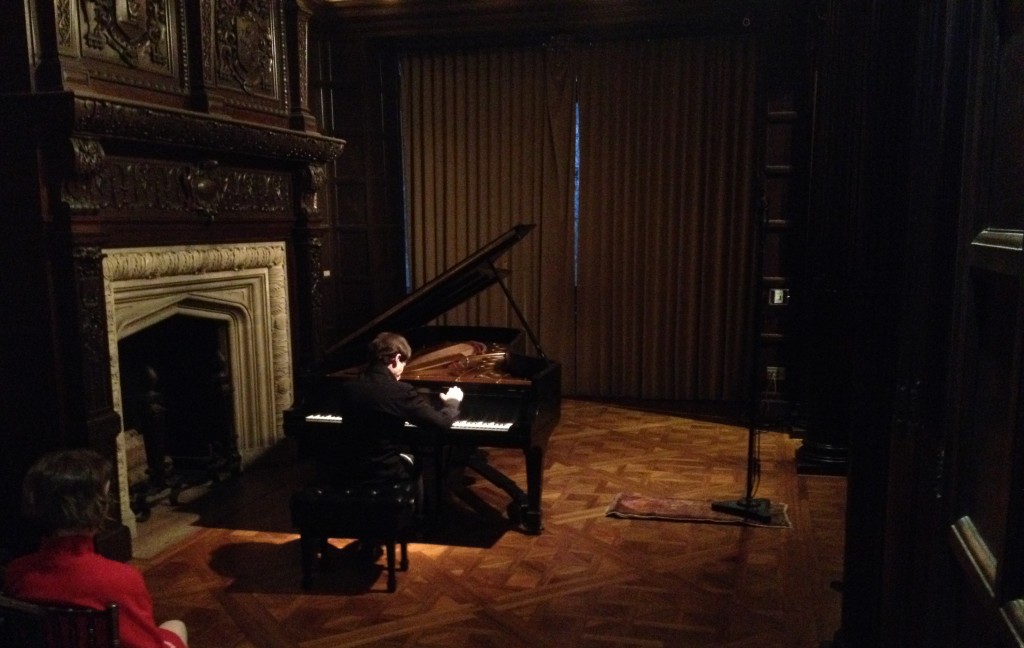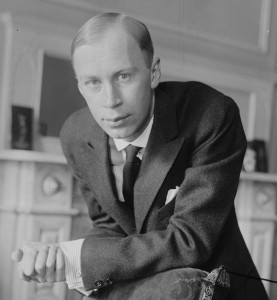In an earlier post we heard from Israeli pianist Boris Giltburg on the complex and often ambiguous nature of Prokofiev’s Eighth piano sonata. Here, he offers more of his perspectives on Prokofiev, as well as his thoughts on Maurice Ravel’s La Valse, and Prokofiev’s countryman and contemporary, Dmitri Shostakovich.
Q: In your performance here at the Phillips you played Ravel’s La Valse, a piece which shares the same mysterious and uncanny waltz as in the second movement of Prokofiev’s Eighth Sonata (also on the program)—what images do these impressions of dances evoke for you?
A: The two works probably have more in common than the observed similarity would suggest. If the Eighth Sonata could more or less plausibly be regarded as a reaction to the horrors of WWII (and at least somewhat a reaction to the horrors of Stalin’s regime), then Ravel’s La Valse could be viewed as a reaction to the horrors of WWI. Even though Ravel had the idea of writing a kind of homage to the elegance and the joie de vivre of the Viennese waltz as early as in 1906, it was not till 1919-20 that the work got to its present form—a form by the end of which that very elegance and joie de vivre is completely crushed and destroyed by the barbaric, mindless aggression that the coda brings with it. I personally hear there the collapse of the old Europe (and the Belle Epoque) as Ravel knew it—and I think that a talented cinematographer could make a first-class short movie based on the music, as Ravel’s writing there is extremely visual (which is not a surprise, as Ravel intended it as a ballet for Sergei Diaghilev, with whom he had previously collaborated on Daphnis et Chloé; only Diaghilev, upon hearing Ravel perform the work for him in the two piano version, declared it was a masterpiece, but a “portrait” of a ballet rather than a proper ballet, and refused to produce it. Ravel never spoke a word to him again, and upon meeting him the next time some five or six years later, refused to shake his hand, which prompted Diaghilev to challenge him to a duel, which–thankfully–never took place).
(Boris Giltburg performs Ravel’s La Valse)
Thinking of it in comparison with Prokofiev’s second movement (of the Eighth Sonata)–I think the dance serves a different purpose in the two works. In Prokofiev, the second movement is a moment of respite, and the dreamy, slightly eerie dance is the setting in which this respite takes place. In Ravel, the dance is all–it’s the lifeblood of the music, its pulse and essence; it’s what the work is, and should we prefer not to see any historical connections within the music, we could say that it is about the birth, growth, glory and, finally, the death of the waltz.
If we do seek the extra-musical interpretation, we could say that the waltz in the first 2/3 of the work is a representation of that selfsame Belle Epoque: carefree, elegant, nonchalant, sensuous–and when things start going sour, in the beginning of the recapitulation, the waltzing pairs strive valiantly to remain blind to the danger which quickly surrounds them (Ravel, himself like a talented cinematographer, doesn’t show us that danger quite yet; he only lets us feel that there are increasingly dark clouds gathering on the horizon), until the moment where such blissful oblivion is no longer an option–that danger, whatever it is, is fully upon them, and the waltz is overpowered, ripped apart and utterly destroyed by the work’s end. This is really strong stuff!
(Leading into the recapitulation in Ravel’s La Valse)
Prokofiev, in comparison, never quite leaves the safe boundaries of his waltz in the 2nd movement–nor does he want to; the overpowering, ripping apart and destruction are all left to the development and coda of the first movement, and later, to the scary middle section and the mad triumph of the finale’s end–at which point I often wonder who triumphed over whom (leading us back into the question of Prokofiev’s intentions and ambiguity).
(The finale of Prokofiev’s Eighth Piano Sonata)
Q: As well as playing this music, you write about it, often in extremely illuminating ways as in the liner notes of your recordings and on your blog. Fairly recently you wrote in depth on Shostakovich’s last opera, Lady Macbeth of the Mtsensk District, and the political context surrounding the Soviet admonishments of his music. What does the situation look like to you for Prokofiev?
A: My initial, impulsive response would be ‘much worse,’ but this is an emotional one: it comes from the fact that, while Shostakovich managed to outlive his main tormentor–Stalin–and live for 22 more years, composing until the very last days of his life, Prokofiev did not; he died on the very same day as Stalin, and if the widely circulated story is true, was so poor at the time of his death (due to concert organizers refusing to program his works after the vicious attack by the Party on ‘formalists’ in music in 1948, which put Shostakovich, Prokofiev and Khachaturian on top of the hardcore formalists’ list) that he had no proper shoes to be buried in. Rostropovich, a close friend, admirer, and supporter, had to give him a pair of his own. Vishnevskaya (Rostropovich’s wife) recalls in her memoirs that there were no flowers to be bought anywhere in Moscow–everything had to go to Stalin. And the funeral itself had to be postponed for three days, as the throngs of those waiting to say the last farewell to the Father of Nations filled the streets and did not allow those carrying Prokofiev’s coffin to leave the house. Looked at from this point of view, Shostakovich managed to survive, while Prokofiev was defeated.

Dmitri Dmitrievich Shostakovich (September 25 [O.S. September 12] 1906–August 9, 1975) was a Russian composer of the Soviet period, 1942. Source: Wikimedia Commons
It has just now occurred to me that with Prokofiev’s death, Shostakovich remained the sole truly great composer of his time in the Soviet Union, the last one to stand out, by a wide margin too–and thus probably also the first to bear the brunt of any displeasure the Party would display. And I wonder whether this ‘last-man-standing’ factor–Shostakovich must have been aware of it, no matter how ardently he supported young composers whom he deemed talented–has perhaps also played a role in Shostakovich’s becoming more and more closed within himself as the years went by, wearing a mask of cooperation and at times even of obedience, while only letting his music speak of the emotions and thoughts which were enclosed within him.
Q: It was a pleasure to have you perform here at the Phillips. Where have you been since your appearance here last November?
A: The six months since playing at the Phillips have been very intense; I played for the first time at the Musikverein in Vienna (Beethoven No. 3), gave recitals at the Gewandhaus Leipzig and the Queen Elizabeth Hall London, and returned to St. Petersburg (Rachmaninov No. 3), Krakow (Mozart K.491), Brussels and Antwerp (recitals) among others. Just now I’ve returned from a two-month long tour (tough!), which included a return to the Amsterdam Concertgebouw, a recital in London, recital tours of China and Japan and debuts in Singapore and Seoul. It has been incredibly challenging and exciting at the same time–you really feel you are alive. In the next months I will be visiting South America several times–playing for the first time at the Teatro Colon (Prokofiev No. 3), returning twice to the Teatro Municipal in Santiago de Chile; also a big recital tour of Brasil, and a concerto performance there under Marin Alsop (with whom I will we also working in Baltimore in November). And there’s a new CD to be recorded: it’s a Schumann disk, to be released in the winter. It’s all a bit non-stop, but the music to be played is utterly great.
–Boris Giltburg
Interviewed by Jeremy Ney, Music Specialist



Enjoyed this interview a lot, adding context to these pieces. Thanks for the journey.